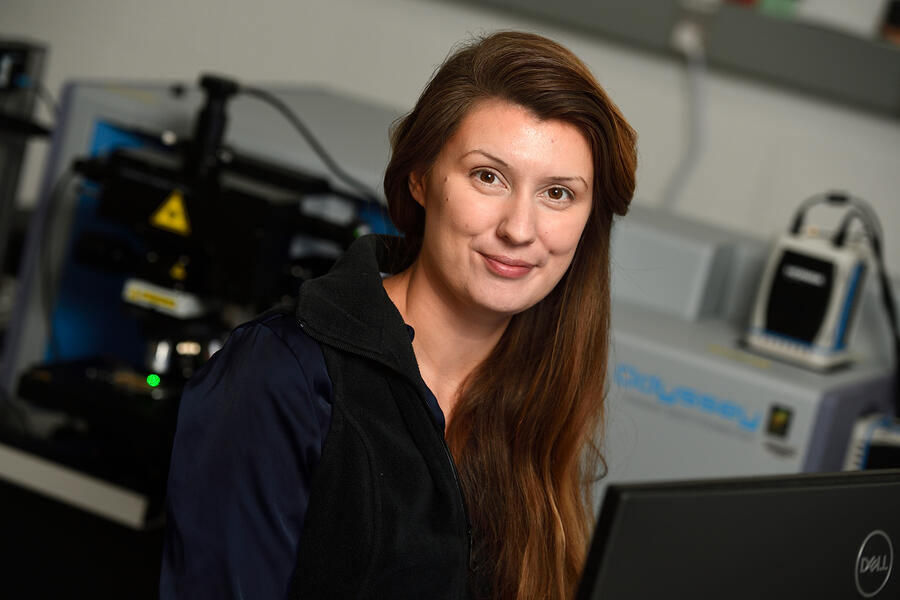- Name
- Johns Hopkins Media Relations
- jhunews@jhu.edu
- Office phone
- 443-997-9009
Jasmina Wiemann, assistant professor in the Department of Earth and Planetary Sciences at Johns Hopkins University, has been awarded a 2025 Packard Fellowship for Science and Engineering, a prestigious award designed to allow the nation's most promising early-career scientists and engineers flexible funding to take risks and explore new frontiers in their fields of study.
Each of 20 fellows will receive $875,000 over five years to use in whatever ways will best advance their research.
"Now, without any time delay, we can dive right in and follow—very creatively and intuitively—patterns that we see in the data related to the very broad range of research questions we're interested in," Wiemann said.
Wiemann combines tools from chemistry, biology, and geology to bridge what she calls the "molecular gap" between life past and present. Modern biology relies on insights from genomes and proteomes to learn how organisms responded to recent environmental and ecological changes, with the goal of predicting how modern biodiversity may respond in the future to ongoing climate change. But this information has been considered unavailable for extinct organisms because it can't be extracted from the fossil record, resulting in a gap in knowledge about the long-term mechanisms of evolution on ever-changing Earth.
To fill this gap, Wiemann pioneered the field of molecular geo-, astro-, and paleobiology. Her lab applies experimental, empirical, and theoretical approaches to characterize the fates of informative biomolecules and the different biological signatures that they encode both on Earth and elsewhere in our solar system. The exploration of such molecular "fingerprints" allows for the combined analysis of samples from both modern and long extinct, fossilized organisms, including traces of the earliest life forms on Earth. The resulting database, which curates a collective fingerprint of life, can help answer ecological and evolutionary questions as well as astrobiological ones, and has implications in the search for traces of life as we do not yet know it.
Exploring the patterns in this new type of primary data, lab members track the alterations of molecular biosignatures through deep time and space. The lab includes experts working on different parts of the tree of life and different geological settings—with the shared goal of deciphering the foundational mechanisms behind the origins, evolution, and evolvability of species and their emergent properties.
Drawing on their understanding of the rules of long-term evolutionary responses to past environmental change, the team works not only to understand why certain species went extinct during past mass extinction events while others survived, but also to predict long-term evolutionary responses to ongoing planetary change. Those models, in turn, should yield guidance for conservation efforts.
With these tools, for the first time, they are able to explore molecular insights into roughly 3 billion years of evolutionary history that were previously inaccessible, with the biosignatures creating new scientific opportunities. As the team explores their data and follows it toward new questions, Wiemann said the fellowship comes at a welcome moment, allowing them to quickly move from discovery to innovation.
"The privilege of having very fast-paced science in this brand-new discipline, experiencing this constant thrill of true discovery as a byproduct of collecting new data, and running wild when it comes to creative and societally relevant applications of our mechanistic insights—these are the three most exciting aspects that this award will catalyze," she said.
Wiemann was part of a junior research program in chemistry at the Technical University of Dortmund and earned a bachelor's degree in geosciences and a master's in organismal and evolutionary biology, both at the University of Bonn, Germany, and an MPhil and PhD at Yale. She held Trimble and Barr postdoctoral fellowships at Caltech and an Agouron Institute Fellowship at the University of Chicago and the Field Museum.
Wiemann is the 20th scholar affiliated with Johns Hopkins to receive this fellowship, which was established by the David and Lucile Packard Foundation in 1988 "to encourage fellows to think big and look at complex issues with a fresh perspective."
Posted in Science+Technology








